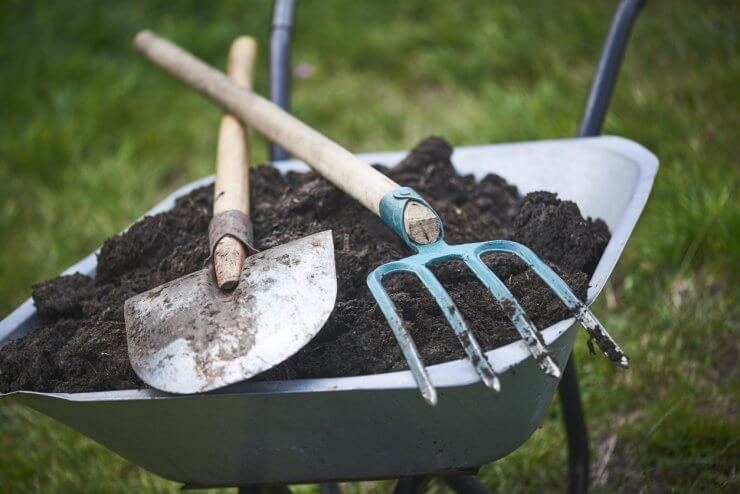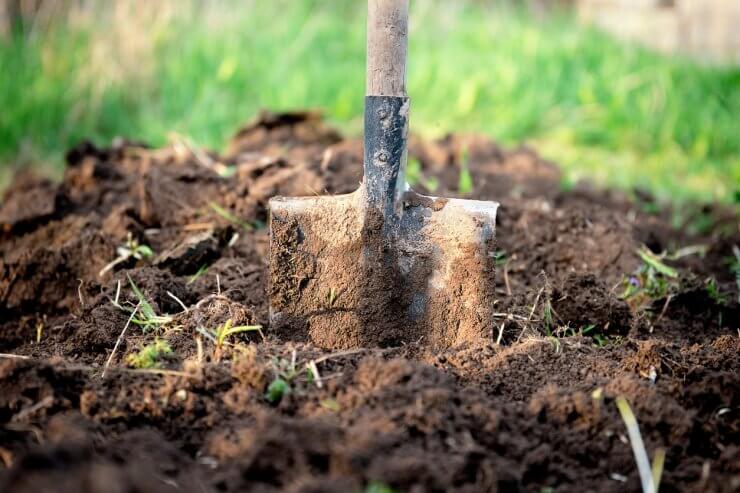
Ah… the sweet sights and sounds of spring. It’s the time of the year when robins are plucking worms from the grass, tulips and crocuses are in bloom, our radishes and peas are ready to harvest, and our spring composting work is well underway. But what is that exactly? Isn’t composting just a matter of tossing our vegetable peels and eggshells into a pile and letting nature do its thing?
That’s sort of true. Composting is a natural process. Microbes break down all those onion skins, pepper seeds, eggplant stems, grass clippings, and similar matter into nutrient-rich finished compost without too much help from us. Our job is to create the ideal conditions for those microbes by adding in the right ingredients and giving the compost pile an occasional stir.
There are, however, some differences in how we compost in different seasons. So winter composting, for example, is a pretty easy job since we don’t want to stir things too much and let the heat escape. Spring composting, on the other hand, is when things really get moving. But there’s something you need to know.
Discover 7 top tips for growing, harvesting, and enjoying tomatoes from your home garden—when you access the FREE guide The Best Way to Grow Tomatoes, right now!

Spring composting: What it is, what it isn’t, and how to make great compost
There are a few things about spring composting that you should know before we get much further. First, compost takes a while to go from vegetable peels, and plant stems to the black gold that gardens love. It can take anywhere from several weeks to several months, depending on factors like temperature, moisture, and so on.
So if you’re starting your composting in the spring, it will be a little while before you can use it. That’s okay, though! In fact, that can be great. Let’s come back to that in a sec.
If you started your compost back in the fall with all those brown leaves and garden plant matter, it’s probably ready to use. It’s also really easy to use. You can work it into the soil of your garden, where it will slowly enrich the soil and offer nutrition to your plants.
I also like using compost as mulch. You get triple duty out of your compost this way: it keeps the roots and young seedlings moist, helps prevent weed growth, and acts as a fertilizer as it integrates into the soil.
Now back to that compost pile you’re just starting. First, just because your spring composting efforts won’t yield immediate results, don’t give up! As gardeners, we have to think ahead, and this is an ideal time to start composting.
There are several ways you can set up your composting, which you can read about in some of our great articles below. Essentially, you want a mix of half brown material (dry leaves or grass, unbleached paper egg cartons, etc.) and half green (vegetable matter, banana peels, etc.). Pile it all together and give it a mix a couple of times each week.
-
How to Create a 3 Bin Compost System with Recycled Materials
-
How to Make Natural Compost from Everyday Food Waste
-
The Best Compost Ingredients for Making Black Gold
You may have some compost ready to use by early summer. If that’s the case, feel free to add it into your soil for any late summer or early fall plantings.
Your compost might still need time to break down, though. This is where your spring composting efforts can pay off, however. Work all that good compost into the soil as you clean up your garden in fall or early winter.
Over the next few months, those nutrients will spread around your garden bed, and you’ll have rich, healthy soil ready for spring planting. It’s the long game, as so much in gardening can be.
And while you’re at it, rake up and mulch all those fall leaves and plant material from your garden. Add that to your compost pile, and when spring rolls around, you can enrich your garden even further with your fall compost.
Have you started a compost pile in the spring? How long did it take to break down into useable compost?
Discover 7 top tips for growing, harvesting, and enjoying tomatoes from your home garden—when you access the FREE guide The Best Way to Grow Tomatoes, right now!




